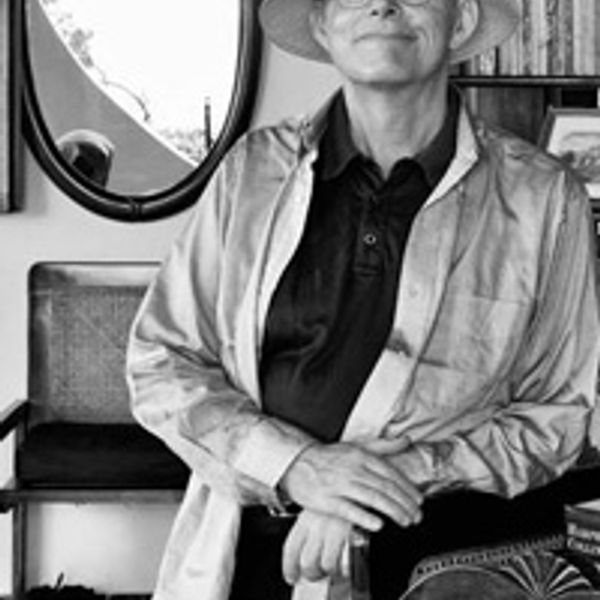Lia Purpura, Parasol Mushroom (detail), featured in AGNI 102
The Low Door
They were driven out, they wandered all day long. And now, in the thick grass at the world’s end, here they are before a large house, long and narrow, with all its shutters closed, on a farm that seems abandoned. But look, there in the lean-to, that low door, almost open… We can force it and enter. Duck your head, will you?
A door? Through the cracks in the wood they perceive some trees that are the same as here where they still stand, with the same shaggy underbrush beneath nearly the same sky; and if the door resists when they push, it’s because on the other side it’s covered with brambles—like the ones in the world they’re leaving, that scratch their bare legs, their knees.
This low door is quite familiar, by the way. It reminds them of their childhood home, and of the big enclosure at the end of the garden where in the evening, when everything turned ominous with shadows and cries, they liked to take refuge before they were called in for dinner. In this back-garden there was a little house left in ruins, where they hid themselves. I slipped in first, and you followed me. We were then in a very low room, with a ceiling that had collapsed because of a half-fallen beam. We would lie down on the floor, in the dry, fragrant straw.
So be it… But now we’ve passed through the door, this low door of the final day. Oh, is that you? How you’ve grown! Night has fallen, this head of yours touches the starry sky, these hands of yours pick up strange things in the dark on every side. Your eyes of an unknown color seek mine: how afraid I am! You draw near me, you tell me, “Come.” And we’re going to have to walk, walk a long time, walk until it’s late, in this other world—and it will be cold.
We were saying to each other: Who are you? What name do we keep in the abyss? What will be left to gleam—a bit of iron, a pebble?—in this shallow stream close to where we used to lie down, in the warm straw of a room from another century, abandoned to ruin.
Yves Bonnefoy died this month. Often acclaimed as one of France’s greatest poets, he published ten major collections of verse, several books of tales, and numerous studies of literature and art. His work has been translated into scores of languages and won many international awards. He is also a celebrated translator of Shakespeare, Yeats, Keats, and Leopardi. He succeeded Roland Barthes in the Chair of Comparative Poetics at the Collège de France. His latest poetry collection is Ensemble Encore (Together Still). (6/2016)
Hoyt Rogers has published a poetry collection, Witnesses, and a volume of criticism, The Poetics of Inconstancy. His fiction, poetry, and essays have appeared in a wide variety of periodicals and anthologies. He translates from the French, German, Italian, and Spanish. He has translated three books by Yves Bonnefoy: The Curved Planks (Farrar, Straus & Giroux), Second Simplicity (Yale University Press), and The Digamma (Seagull Books). Two more works by Bonnefoy, Together Still and Rome 1630, are forthcoming at Seagull. (6/2016)

Yves Bonnefoy
Yves Bonnefoy (1923–2016) is often acclaimed as one of France’s greatest poets. He published ten major collections of verse, several books of tales, and numerous studies of literature and art, and was a celebrated translator of Shakespeare, Yeats, Keats, and Leopardi. His work has been translated into scores of languages, and he earned many honors, including the European Prize for Poetry (2006) and the Kafka Prize (2007). He succeeded Roland Barthes in the Chair of Comparative Poetics at the Collège de France.

Hoyt Rogers
Hoyt Rogers’s forthcoming works include Sailing to Noon, the first novel in The Caribbean Trilogy (with Artemisia Vento). He is the author of the poetry collection Witnesses and book of criticism The Poetics of Inconstancy. His poems, stories, and essays have appeared in New England Review, The Antioch Review, AGNI, The Fortnightly Review, and dozens of other publications. Rogers also translates from French, German, Italian, and Spanish. He has translated four books by Yves Bonnefoy, most recently Rome, 1630 (Seagull Books, 2020), which won the French American Foundation’s Translation Prize. He translated and edited, with Paul Auster, an anthology of poems and journal entries by André du Bouchet, Openwork (Yale University Press, 2013); and with Eric Fishman, he translated du Bouchet’s Outside (Bitter Oleander Press, 2020). (updated 10/2021)
